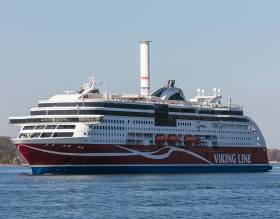Displaying items by tag: Viking Grace
Baltic Ferry Becomes First Passenger Ship in the World to Use Rotor for Wind-Assisted Propulsion
#FerryNews - Scandinavian operator, Viking Line based in Finland, has announced that its LNG fuelled cruiseferry M / S Viking Grace has become the first passenger ship in the world to utilize wind power through mechanical rotor driving.
The rotor sail developed by Norsepower, Finland, saves fuel and reduces emissions. The Viking Line will enter the sailing on the ships routine Turku-Stockholm route with the help of winds.
M / S Viking Grace's 24-meter-high and four-meter wide rotor cask is based on the Magnus phenomenon. When the sail spins, its surface pulls air on one side at less pressure than on one side. The differential pressure generates thrust that moves the ship forward. The sail functions automatically, and the system stops if the direction or intensity of the wind changes to the ship as unfavorable. With rotor dinghy, the ship's emissions are reduced by up to 900 tonnes per year depending on wind conditions.
The introduction of rotor dinghy reflects the green values of Red ships. For the Åland shipyard, the sea and the archipelago have been a heartbeat and a prerequisite for livelihood for decades. M / S Viking Grace, which started operations in 2013, is already the world's most environmentally friendly ship: it moves with liquefied natural gas and is low in emissions and low noise. Thanks to the new sail, the Turku archipelago is sailing even more environmentally friendly.
This is a great day for us. As an Ålandian shipping company, we live in the sea, so promoting our well-being is of great importance to us. We want to be the forerunners in utilizing solutions that reduce environmental loads. Norsepower, a Finnish manufacturer of mechanical rotor cranes, is the world's leading solution to reduce fuel consumption and it is immensely great for us to introduce this innovation to M / S Viking Grace as the first passenger in the world, "says Jan Hanses, President of Viking Line .
Norsepower, a Finnish cleantech company, has developed its rotor blade for five years. The idea of a rocket sailor is already about a hundred years old, but as the environmental requirements become more intense and as material and technology solutions develop, the solution has become very topical and interesting. Norsepower has been in the development for many years ahead of other players.
In addition to the M / S Viking Grape-mounted rotor crane, Viking Line's new, 2020-ready vessel will benefit from wind propulsion technology. Two Norsepower mechanical sails will be installed on a passenger ship built in China, and thus the potential for wind power will be doubled.
























































